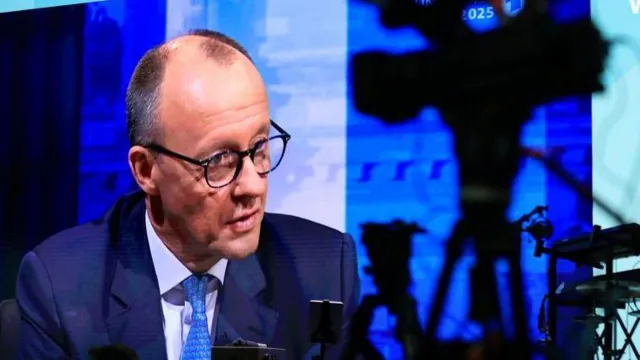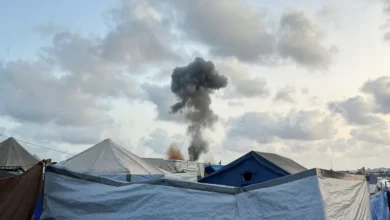New German leader signals seismic shift in transatlantic relations


Friedrich Merz says he is eager to re-engage with international partners
Germany’s chancellor-in-waiting, didn’t wait for the final results of his country’s election on Sunday to herald a new era in Europe.
Declaring the US indifferent to this continent’s fate, Friedrich Merz questioned the future of Nato and demanded Europe boost its own defences. Quickly.
This tone from the close US ally – and from Friedrich Merz who is known to be a passionate Atlanticist – would have been unimaginable even a couple of months ago.
It’s a seismic shift. That may read like hyperbole, but what we are now experiencing in terms of transatlantic relations is unprecedented in the 80 years since the end of World War Two.
Big European powers have been shocked to the core by the Trump administration, which suggests it could revoke the security guarantees to Europe in place since 1945.
“I would never have thought that I would have to say something like this in a TV show but, after Donald Trump’s remarks last week… it is clear that this government does not care much about the fate of Europe,” Friedrich Merz said during a post-election debate on Sunday.
“My absolute priority will be to strengthen Europe as quickly as possible so that, step by step, we can really achieve independence from the USA,” he added.
Merz hinted that the endeavour was so urgent that he was not sure on whether the transatlantic alliance leaders gathering for a summit in June “would will still be talking about Nato in its current form or whether we will have to establish an independent European defence capability much more quickly”.
Significantly, the forthcoming chancellor put Donald Trump’s America on a par with Russia – widely viewed here as a security threat to Europe more broadly. “We are under such massive pressure from two sides that my absolute priority now really is to create unity in Europe,” Merz said.
The UK prime minister heads to Washington on Thursday, following the visit there on Monday by French President Emmanuel Macron.
Friedrich Merz admits, indirectly, to a sense of Fomo – fear of missing out. By rights Germany should be there, too, this week, he says. Berlin, is one of Europe’s Big Three powers, alongside France and the UK.
And with the US and Russia now pow-wowing bilaterally, about, but not with, Ukraine, it feels like a global return to big-power politics.
But Germany has been MIA [missing in action] for a good while now on the European and the world stage. The outgoing government here was weakened and distracted by vicious internal bickering. This infuriated German voters – who wanted urgent focus on the economy and migration – and European allies, demanding action on Russia, security and defence.
Merz says a top priority for Germany is to re-engage internationally.
The country is already the second-biggest donor of military aid to Ukraine, after the US.
Merz wants to continue that support, but, unlike France and the UK, he’s been reticent about the idea of sending soldiers to Ukraine, to back up an eventual ceasefire there.
Based on Germany’s track record though – it dragged its heels at every stage of Ukraine support, and despite that, ended up delivering more aid than any of its European neighbours – a ‘No’ now, doesn’t mean a ‘No’ forever to committing troops or participating in whatever form a European “reassurance force” in Ukraine may take.
Germany’s conservatives celebrate, but far right enjoy record result
Analysis: Big challenges loom for Germany’s Merz in divided country
Friedrich Merz: The risk-taker who flirted with far right
For now, the soldiers Germans most worry about are the 35,000 American ones, stationed in their country, that make them feel safe.
It’s highly unusual for foreign policy to be a top voter concern at election time. But in Germany this weekend, alongside the economy and migration, voter after voter said they worried about peace in Europe and felt very insecure.
Back in November, Germany’s interior ministry said it was drawing up a list of bunkers that could provide emergency shelter for civilians.
Ukraine may be far away, but Germans feel at great risk from Russia for two reasons.
Firstly, the amount of military equipment their country has sent Ukraine. The far right, Alternative for Germany (AfD), with its “Germany First” slogan, campaigned for Berlin to disengage from Kyiv and to re-establish relations with Russia. A strategy not unlike Donald Trump’s, as the party is fond of pointing out.
Secondly, many in Germany think that if Russia wanted to really destabilise Europe, it might be tempted to strike one of the Big Three with a long-range missile.



